From Bulbapedia, the community-driven Pokémon encyclopedia.
Paradox Pokémon (Japanese: パラドックスポケモン Paradox Pokémon) are a group of Pokémon found in Pokémon Scarlet and Violet. They have two subgroups: one made of Pokémon resembling ancient relatives of contemporary PokémonS, and one resembling futuristic relatives of contemporary PokémonV. They are all gender unknown and unable to evolve or breed, and — with the exceptions of Koraidon and Miraidon — their names do not follow regular naming conventions. All of them share the category of Paradox Pokémon.
They are also known as unidentified creatures and Enigmas of Paldea by researchers and Occulture articles, respectively. Professor SadaS/Professor TuroV are the head researchers on the Paradox Pokémon. The professors also refer to the Paradox Pokémon as ancient PokémonS/future PokémonV.
History
The first recorded sightings of Paradox Pokémon were documented 200 years ago in Area Zero within the Great Crater of Paldea located in the center of the Paldea region. A member of the Area Zero exploration team named Heath wrote about these sightings in the Scarlet BookS/Violet BookV. Area Zero would be occupied by scientists researching the Paradox Pokémon and the Terastal phenomenon. Eventually, a paranormal magazine called Occulture published articles on these sightings and theorized about what the Paradox Pokémon could be. At the time, the Paradox Pokémon were believed to have been fabricated by Heath, thus not being considered real. It is unclear how these first Paradox Pokémon arrived in Paldea.
Ten years ago before the events of Pokémon Scarlet and Violet, the Paradox Pokémon from the ancient pastS/distant futureV were brought into the present using a time machine built by Professor SadaS/Professor TuroV. The Professor used the time machine to send Poké Balls to different points in the timeline. The Poké Balls then caught the Paradox Pokémon, before bringing them into modern time. The reason the professor created the time machine was because they were fascinated with the Paradox Pokémon after reading about them from the Scarlet BookS/Violet BookV.
The professor conducted research on these Pokémon, with the ultimate goal of establishing a sanctuary in which they would be able to coexist with modern-day Pokémon. This goal would be called Project Tera. At some point, the professor created an AI version of themselves, to assist in research on Paradox Pokémon, using the very same Terastal energy that helped create the time machine. However, due to how dangerous they were to the ecosystem of Paldea, the Paradox Pokémon were kept locked away in Area Zero. At some point, security blocks and Poké Ball Lock System were created to help both protect the time machine and Paradox Pokémon.
The player's KoraidonS/MiraidonV was the first of the Paradox Pokémon to be brought into the present; a second specimen was later brought into the present as well, but it proved to be far more aggressive than the original and drove it away in a territorial dispute. It is later revealed that the professor was killed by the second specimen while defending the first. Because of this, eventually the Paradox Pokémon would continue to arrive in the present and eventually form their own population in Area Zero. Meanwhile, the Professor AI counterparts realized that the project was a mistake and that their creators' dreams were doomed to failure; however, their programming prevented them from doing anything that might stop the project directly.
Later, during the events of Scarlet and Violet, a Great TuskS/an Iron TreadsV somehow escaped and became a Titan Pokémon that roamed the Asado Desert. The player and Arven defeated it, putting an end to its rampage.
During the events of The Way Home, the player, Arven, Nemona, and Penny encountered several Paradox Pokémon while heading deeper into Area Zero. At Research Station 2, they encountered a Scream TailS/an Iron BundleV, which Penny mistook for an ordinary JigglypuffS/DelibirdV until it became hostile. At Research Station 3, they encountered a Great TuskS/an Iron TreadsV, like the one fought in the Asado Desert. Then, outside the Zero Lab, the second KoraidonS/MiraidonV was encountered before the group was ambushed by a group of Paradox Pokémon: Great Tusk, Brute Bonnet, and Flutter ManeS; or Iron Treads, Iron Hands, and Iron JugulisV. The AI SadaS/TuroV fights the player against their will using seven Paradox Pokémon in an attempt to defend the time machine, only for the player and their KoraidonS/MiraidonV to put a stop to it. The time machine that summoned the Paradox Pokémon was then shut down when AI SadaS/TuroV used it one final time to travel into the ancient pastS/distant futureV.
Afterward, the rest of the Paradox Pokémon can be found in Area Zero during the post-game, including Roaring MoonS/Iron ValiantV and the second KoraidonS/MiraidonV.
In the games
Ancient Pokémon
These Pokémon look like ancient relatives of contemporary Pokémon. They all share the Protosynthesis Ability, with the exception of Koraidon, which has Orichalcum Pulse. Their Abilities involve the effect of harsh sunlight in battle.
| Ndex
|
Paradox Pokémon
|
Contemporary Relative
|
| Image
|
Type
|
Enigmas of Paldea
|
Image
|
Type
|
| #0984
|
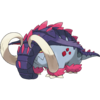
Great Tusk
|
Ground Fighting
|
Great Tusk: A Living Relic of the Dinosaur Era?!
- In one arid corner of Paldea, there have been reports of a mysterious life-form. It's said to resemble a Donphan at first glance, albeit one with gigantic tusks, tough scales, and an aggressive disposition.
- Leading theories hold that this being is nothing less than a living relic of the dinosaur era, but no one can say for sure. Apparently, it's called Great Tusk after the name of a strange being that was written about in the mysterious Scarlet Book.
|

Donphan
|
Ground
|
| #0985
|

Scream Tail
|
Fairy Psychic
|
Scream Tail: A Billion-Year-Old Jigglypuff?!
- Somewhere in a Paldean forest, it's said, lurks Scream Tail—a being with Jigglypuff's own endearing puffball appearance but also a ferocious aggression that leads it to attack anyone who comes near.
- Its primitive appearance and savage nature have prompted rumors that it could be a Jigglypuff from one billion years ago. It's named after a creature in the Scarlet Book that is described as having a distinctive tail and scream.
|

Jigglypuff
|
Normal Fairy
|
| #0986
|
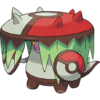
Brute Bonnet
|
Grass Dark
|
Brute Bonnet: Amoonguss Meets Dinosaur?
- This bizarre creature is said to combine traits of dinosaurs with those of the Pokémon Amoonguss. It's named after a fierce mushroom creature of matching description that appears in the renowned Scarlet Book.
- Brute Bonnet certainly resembles Amoonguss, though with its own unique twists: its gigantic stature and seemingly low intelligence combine to make it a savage, powerful fighter.
|

Amoonguss
|
Grass Poison
|
| #0987
|

Flutter Mane
|
Ghost Fairy
|
Flutter Mane: A Ghostly Pterosaur?!
- Flutter Mane—a name taken from a strange creature with a matching description appearing in the Scarlet Book—is said to float around the sky at night with its long hair writhing about it.
- Eyewitness accounts describe it as resembling a giant Misdreavus at first glance, albeit a highly fierce and aggressive one. Some believe that it's a ghost of a pterosaur from a long-gone era.
|

Misdreavus
|
Ghost
|
| #0988
|
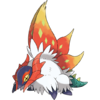
Slither Wing
|
Bug Fighting
|
Slither Wing: A Prehistoric Volcarona, Revived?!
- There have been precious few sightings reported of the ultra-mysterious Slither Wing, a being whose name is taken from that of a similar-seeming creature described in the ever-puzzling Scarlet Book.
- Slither Wing shares traits with Volcarona, so some theorize that it may have been revived from fossils from a prehistoric era that we have discussed in these pages. However, no Volcarona fossils of that era are known to have been found.
|
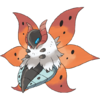
Volcarona
|
Bug Fire
|
| #0989
|

Sandy Shocks
|
Electric Ground
|
Sandy Shocks: A Magneton with a 10-Thousand-Year Lifespan?!
- Some scientists claim that this mysterious being is a Magneton that has lived for 10 thousand years. It has been sighted numerous times in Paldea's more arid regions, but there are no reports of it ever having been caught.
- It's said that Sandy Shocks is an aggressive sort and that some people who've seen it have been attacked as well. It takes its name from a beast with a matching description in the era-defining Scarlet Book.
|
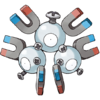
Magneton
|
Electric Steel
|
| #1005
|

Roaring Moon
|
Dragon Dark
|
Roaring Moon: A Primeval Salamence?!
- This elusive creature is called Roaring Moon after a similarly described being in the Scarlet Book. It looks similar to Salamence when they undergo a certain phenomenon elsewhere in the world, but it's unclear if there is any connection.
- This creature scatters feathers as it flies around at high speeds seeking prey. It's thought to be more savage than Salamence, and if you should encounter one, it's imperative that you avoid actual contact.
|

Mega Salamence
|
Dragon Flying
|
| #1007
|

Koraidon
"Winged King"
|
Fighting Dragon
|
Pokédex entries
- This seems to be the Winged King mentioned in an old expedition journal. It was said to have split the land with its bare fists.
- This Pokémon resembles Cyclizar, but it is far burlier and more ferocious. Nothing is known about its ecology or other features.
|

Cyclizar
|
Dragon Normal
|
|
|
Future Pokémon
These Pokémon look like futuristic relatives of contemporary Pokémon. They all share the Quark Drive Ability, with the exception of Miraidon, which has Hadron Engine. Their Abilities involve the effect of Electric Terrain in battle.
| Ndex
|
Paradox Pokémon
|
Contemporary Relative
|
| Image
|
Type
|
Enigmas of Paldea
|
Image
|
Type
|
| #0990
|

Iron Treads
|
Ground Steel
|
Iron Treads: An Alien Weapon?!
- In one arid corner of Paldea, there have been reports of a mysterious life-form. It's said to resemble a Donphan at first glance, albeit one that can abruptly assume a spherical shape and launch into a swift rolling attack.
- Rumors say this being is some kind of weapon using technology not of this world, but no one can say for sure. Apparently, it's called Iron Treads after the name of a strange being that was written about in the mysterious Violet Book.
|

Donphan
|
Ground
|
| #0991
|

Iron Bundle
|
Ice Water
|
Iron Bundle: An Ancient Civilization's Robot?!
- The mysterious Violet Book makes reference to a being called Iron Bundle, which was said to look like Delibird and to possess a spherical apparatus from which it would fire huge blasts of ice to propel itself through snowy lands.
- Plenty of theories about it have been floated. A leading one suggests it is the product of a long-gone civilization—a notion supported by ancient writings that describe the design and usage of machines resembling Iron Bundle.
|
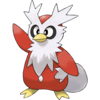
Delibird
|
Ice Flying
|
| #0992
|

Iron Hands
|
Fighting Electric
|
Iron Hands: Secretly a Cyborg?!
- This being's name comes from the one given to an iron-handed entity in the mysterious Violet Book. It is said to have fists that move independent of its body and to be capable of throwing large, fast-moving vehicles.
- A leading theory holds that Iron Hands was once an athlete who became mortally wounded but was kept alive by being made into a cyborg. Why it so strongly resembles Hariyama, however, remains unanswered.
|

Hariyama
|
Fighting
|
| #0993
|

Iron Jugulis
|
Dark Flying
|
Iron Jugulis: Pokémon or Machine?!
- This flying life-form bearing a resemblance to Hydreigon has been seen in a certain corner of Paldea. It was reported to have razed an entire building with a high-energy blast, then flown off as if to find its next objective.
- Iron Jugulis is theorized to be a sort of machine-Hydreigon hybrid, as it combines the former's ruthlessness with the latter's ferocity. It takes its name from a similarly described entity in the Violet Book.
|
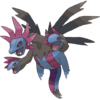
Hydreigon
|
Dark Dragon
|
| #0994
|

Iron Moth
|
Fire Poison
|
Iron Moth: A UFO Sent to Spy on Humankind?!
- The name Iron Moth was borrowed from that of a flying object described in the era-defining Violet Book. It was said to resemble Volcarona and would descend from the skies, following people around and occasionally even attacking them.
- Some point to Iron Moth's aggression as a sign that it is, in fact, a UFO of sorts being controlled by alien life. Perhaps something out there is using Iron Moth to observe us, waiting for the moment to mount an invasion...
|

Volcarona
|
Bug Fire
|
| #0995
|

Iron Thorns
|
Rock Electric
|
Iron Thorns: A Tyranitar of the Distant Future?!
- A strange being called Iron Thorns has been sighted in a certain cave in Paldea. This being bears a strong resemblance to Tyranitar, but it apparently displays great coolheadedness and prefers to avoid unnecessary fights.
- It appears to be highly intelligent and clad in metallic armor, causing some to speculate that it may be a Tyranitar as it would appear a billion years from now. Its name comes from a similarly described entity that appears in the Violet Book.
|

Tyranitar
|
Rock Dark
|
| #1006
|

Iron Valiant
|
Fairy Fighting
|
Iron Valiant: An Experiment Gone Wrong?!
- This oddity's name is borrowed from that of an object described in the Violet Book. One theory holds that it is in fact a robot—the product of a mad scientist's efforts to create the most powerful psychic Pokémon of all.
- According to its few eyewitnesses, Iron Valiant appears similar to both Gardevoir and Gallade. It's also said to be cruel enough to take its brilliantly shining blade and cut down anyone confronting it without hesitation.
|
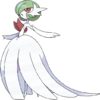
Mega Gardevoir
|
Psychic Fairy
|
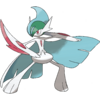
Mega Gallade
|
Psychic Fighting
|
| #1008
|

Miraidon
"Iron Serpent"
|
Electric Dragon
|
Pokédex entries
- Much remains unknown about this creature. It resembles Cyclizar, but it is far more ruthless and powerful.
- This seems to be the Iron Serpent mentioned in an old book. The Iron Serpent is said to have turned the land to ash with its lightning.
|

Cyclizar
|
Dragon Normal
|
|
|
Base stats comparison
Trivia

Imaginary Paradox Pokémon from the Scarlet Book that resembles the
Legendary beasts- All future Paradox Pokémon have "Iron" (or the equivalent in other languages) in their names.
- While this doesn't explicitly apply to Miraidon, its past name was "Iron Serpent", as mentioned in its Pokédex entry from Pokémon Violet.
- Despite having "Iron" in their names, only Iron Treads is actually part Steel-type.
- Donphan, Volcarona, and Cyclizar are the only Pokémon to have Paradox counterparts in both Scarlet and Violet.
- No Paradox Pokémon based on a version-exclusive Pokémon is available in the same game as its present-day counterpart.
- Iron Valiant is the only Paradox Pokémon to be based on more than one Pokémon.
- Roaring Moon and Iron Valiant can be considered counterparts of each other:
- Roaring Moon, Iron Jugulis, and Iron Thorns are the only Paradox Pokémon to have a lower base stat total than their contemporaries. This is because their present-day counterparts are all pseudo-legendary Pokémon, each with base stat totals of 600 (or higher, in the case of Mega Salamence and Mega Tyranitar, both of which have stat totals of 700).
- Iron Valiant also has lower stats when taking into account Mega Evolution, since it's based on Mega Gallade and Mega Gardevoir, which both have stat totals of 618.
- All Paradox Pokémon are dual-type.
- All types except Normal are represented by at least one Paradox Pokémon.
- All Paradox Pokémon share one of their types with their apparent relatives, while replacing or adding a new type.
- Fighting is the most common type for Paradox Pokémon to have, with five Paradox Pokémon having it.
- Iron Bundle and Iron Moth are the only Paradox Pokémon to not share at least one type with another Paradox Pokémon.
- The Paradox Pokémon share similarities with the Ultra Beasts, another group of Pokémon:
- Both only consist of Pokémon that cannot evolve in their debut games.
- Both play a role in the main story of their debut games.
- Both groups consist only of gender unknown Pokémon that are unable to breed.
- Both are connected to Legendary Pokémon.
- The majority of Pokémon in both groups have a base stat total of 570.
- With the exceptions of Koraidon and Miraidon, every Paradox Pokémon and every Ultra Beast has an Ability that boosts its most proficient non-HP stat.
- Promotional material for both groups' debut games did not refer to them as Pokémon or reveal any of their types prior to the games' releases.
- Characters in the games are initially unsure whether the members of either group are actually Pokémon.
- Excluding Koraidon and Miraidon, all ancient Pokémon have odd-numbered base stats while all future Pokémon have even-numbered base stats.
- Additionally, all ancient Pokémon are taller than the Pokémon they are based on, while all future Pokémon (except Miraidon) are shorter.
- The cries of all Paradox Pokémon except Koraidon and Miraidon sample the cries of their contemporary relatives. Furthermore, similarly to the Ultra Beasts, all ancient Pokémon share a unique whistle-like sound frequency in their cries, while all future Pokémon cries share a unique electronic, mechanical noise.
- All moves learned by Paradox Pokémon via leveling up are learned at levels which are multiples of 7.
- In their battle against the player, Professor SadaS/Professor TuroV uses every Paradox Pokémon available in that version of the game except Great TuskS/Iron TreadsV.
- In the Scarlet and Violet Books, there is a sketch of an imaginary Pokémon, based on Paradox Pokémon found in Area Zero. The drawing in the Scarlet Book resembles the three Legendary beasts, while that of the Violet Book resembles the three Swords of Justice.
- Generation II has the most Paradox Pokémon counterparts of Pokémon that debuted during it, with five. Generation IV has the fewest (of generations with at least one), with only one.
- No Pokémon from Generations VI, VII, or VIII have Paradox Pokémon counterparts.
- However, Roaring Moon and Iron Valiant are based on Mega Evolution, which was introduced in Generation VI.
- The Paradox Pokémon (excluding Koraidon and Miraidon) and Type: Null are the only Pokémon to have Spanish and Italian names different to their English names.
- The Pokédex entries for each group of Paradox Pokémon in Scarlet and Violet share a common theme depending on the version:
- Scarlet's entries regarding ancient Pokémon and Violet's entries regarding future Pokémon cite an "expedition journal" or an "old book", referring to the Scarlet BookS/Violet BookV.
- Violet's entries regarding ancient Pokémon and Scarlet's entries regarding future Pokémon cite a "paranormal" or "dubious" magazine, referring to Occulture.
- The term "Paradox Pokémon" may be a reference to Animalia Paradoxa.
In other languages
| Language
|
Title
|
| Chinese
|
Cantonese
|
悖謬寶可夢 Buhtmauh Pokémon
|
| Mandarin
|
悖謬寶可夢 / 悖谬宝可梦 Bèimiù Bǎokěmèng
|
 French French
|
Pokémon Paradoxe
|
 German German
|
Paradox-Pokémon
|
 Italian Italian
|
Pokémon Paradosso
|
 Korean Korean
|
패러독스 포켓몬 Paradox Pokémon
|
 Spanish Spanish
|
Pokémon paradoja
|
|
|
|
See also


















































